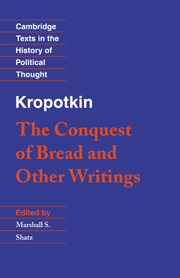Book contents
- Frontmatter
- Contents
- Introduction
- Principal events in Kropotkin's life
- Bibliographical note
- Biographical synopses
- The Conquest of Bread
- Preface
- Our riches
- Well-being for all
- Anarchist communism
- Expropriation
- Food
- Dwellings
- Clothing
- Ways and means
- The need for luxury
- Agreeable work
- Free agreement
- Objections
- The collectivist wages system
- Consumption and production
- The division of labour
- The decentralization of industry
- Agriculture
- Other writings
- Index
- Cambridge Texts in the History of Political Thought
The division of labour
Published online by Cambridge University Press: 05 June 2012
- Frontmatter
- Contents
- Introduction
- Principal events in Kropotkin's life
- Bibliographical note
- Biographical synopses
- The Conquest of Bread
- Preface
- Our riches
- Well-being for all
- Anarchist communism
- Expropriation
- Food
- Dwellings
- Clothing
- Ways and means
- The need for luxury
- Agreeable work
- Free agreement
- Objections
- The collectivist wages system
- Consumption and production
- The division of labour
- The decentralization of industry
- Agriculture
- Other writings
- Index
- Cambridge Texts in the History of Political Thought
Summary
Political economy has always confined itself to stating facts occurring in society, and justifying them in the interest of the dominant class. Therefore, it pronounces itself in favour of the division of labour in industry. Having found it profitable to capitalists, it has set it up as a principle.
Look at the village smith, said Adam Smith, the father of modern political economy. If he has never been accustomed to making nails he will only succeed by hard toil in forging two or three hundred a day, and even then they will be bad. But if this same smith has never made anything but nails, he will easily supply as many as two thousand three hundred in the course of a day. And Smith hastened to the conclusion – ‘Divide labour, specialize, go on specializing; let us have smiths who only know how to make heads or points of nails, and by this means we shall produce more. We shall grow rich.’
- Type
- Chapter
- Information
- Kropotkin: 'The Conquest of Bread' and Other Writings , pp. 165 - 168Publisher: Cambridge University PressPrint publication year: 1995



